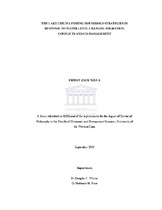The lake Chilwa fishing household strategies in response to water level changes: migration, conflicts and co-management
Abstract
In this thesis, I examine household strategies in response to water level
fluctuations of Lake Chilwa. I also analyse the frequency and patterns of
migration of fishers, conflicts due to migration of fishers and comanagement.
The following are the key results:First, the seasonal and periodic lake level changes affect livelihoods of the households. As a coping strategy, the households depend on fishing in pools of water located in influent rivers and hunt birds for income and food while others migrate to find work as casual labourers. When the lake rises during the rain season, inundated areas become suitable for production of maize and rice. However, when the floods recede in the dry season, farming of winter maize and vegetables is common.Second, migration of fishers is common around Lake Chilwa. The pattern of migration varies according to the season and gear type. The northern marshes and floodplain where fishers land the highest catches composed mainly of Barbus paludinosus, attract more fishers operating different fishing gear types. Conflicts emerge due to the Nkacha seine operations,which require removal of aquatic vegetation. The local fishers believe that the aquatic vegetation is a source of food for fish. The conflicts are in various forms including access to fishing grounds, authority to grant
access to fishing areas and fish price competition between the local fishers
and migrants.Third, the household strategies towards recovery of the fishery after recessions are inherent within the households’ traditional system.However, the introduction of co-management does not recognise key actors that include fishers and river-based fishing households that
participated in the formulation of conservation strategies for remnant fish
stocks in lagoon and rivers during the 1995 recession. Co-management is
characterised by limited participation of the fishers especially those operating seines, district assemblies and non-governmental organisations.
Similarly, there is low transparency especially with respect to how the key
stakeholders, Department of Fisheries and traditional leaders, take decisions. In stark contrast, accountability among Beach Village Sub-
Committees is growing; hence more fishing households now perceive
these as representing the interests of Department of Fisheries.Based on the above results, a diversified occupational change involving fishing, farming and trading is necessary. The co-management arrangement should be adaptive with consideration of the traditional customs and values of the participating households. Since these households are dependent on the availability of fisheries, it is thus imperative to promote maximum resource exploitation in between recessions and encourage a complete stop to fishing during recessions.September 2009

